What is Cachet?
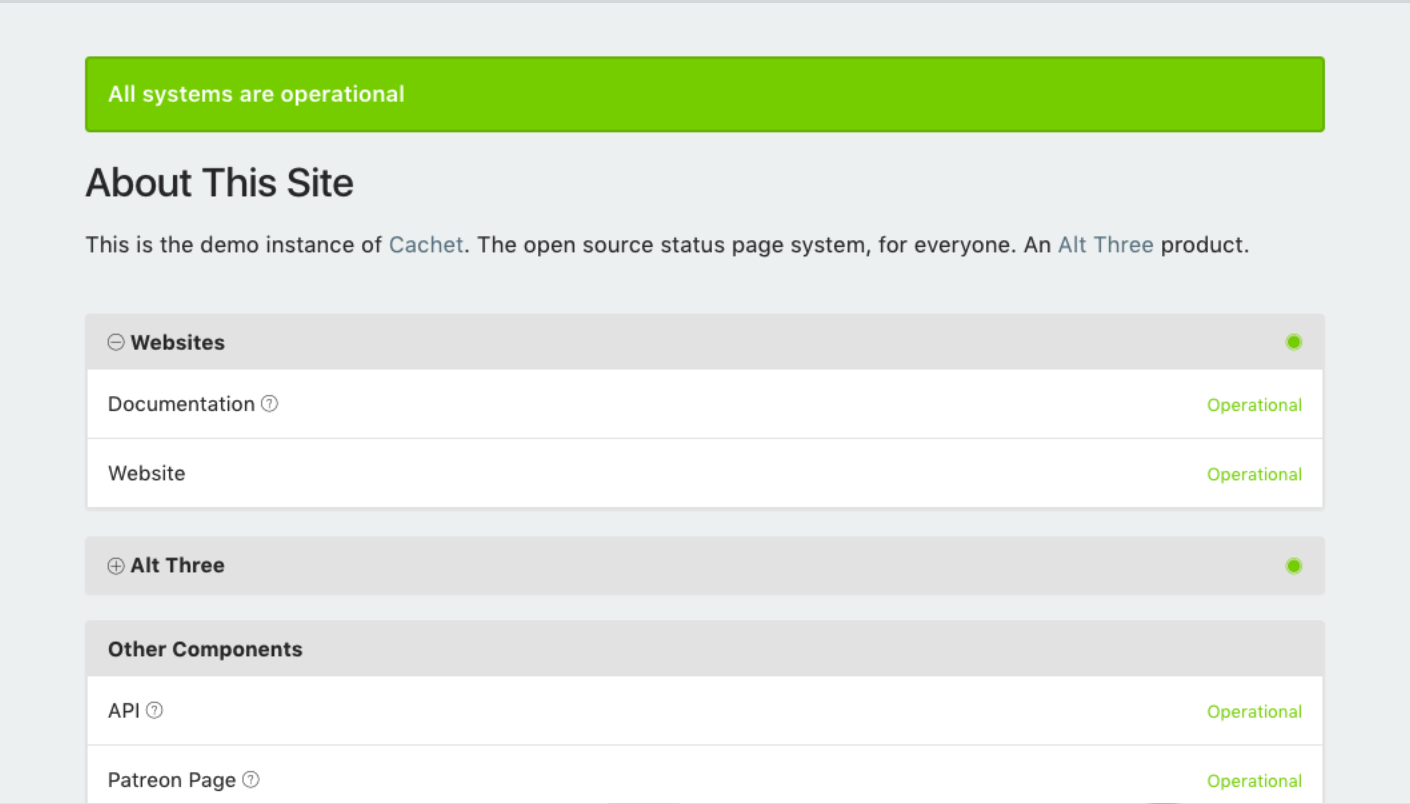
Cachet is an open-source status page system that offers individuals and businesses to monitor basic uptime metrics. At the time of writing, Cachet already has over 185 contributors who have worked on 54 releases of the product.
Cachet has an intuitive, Bootstrap-based user interface that powers responsive design for desktop and mobile devices. This status page system has a chart dashboard that displays metrics in graphs.
In addition, you also get detailed incident reports with text descriptions detailing the timeline from the initial occurrence and final fix.
Cachet has become a go-to status page provider, but there are prerequisites to installing Cachet.
Technical Requirements for Installing Cachet
To start using Cachet, you need to have the following in your tech stack.
- Git
- PHP 5.5.9 (including ext-gd, ext-Simplexml, mcrypt, and ext-xml)
- APC or Redis for caching.
- A database driver (MySQL, PostgreSQL, or SQLite).
- Node.js
- NPM
- Bower
- Gulp
You can also install Cachet on different environments with Docker, as well as locally on your Windows device. If you need help with the installation of Cachet, the starting price is $249. Unfortunately, there are no discounts for students and non-profits.
Cachet also supports third-party integrations and client libraries, which you can find on the official site or GitHub. Users gain access to the platform’s translated version in 10+ languages.
In terms of security, Cachet relies on API tokens and BasicAuth to authenticate users for API requests. Users will also need to generate an OAuth token in order to connect with GitHub.
Now that we know what Cachet has to offer, let’s go through some notable Cachet alternatives.
The First Alternative to Cachet — StatusGator
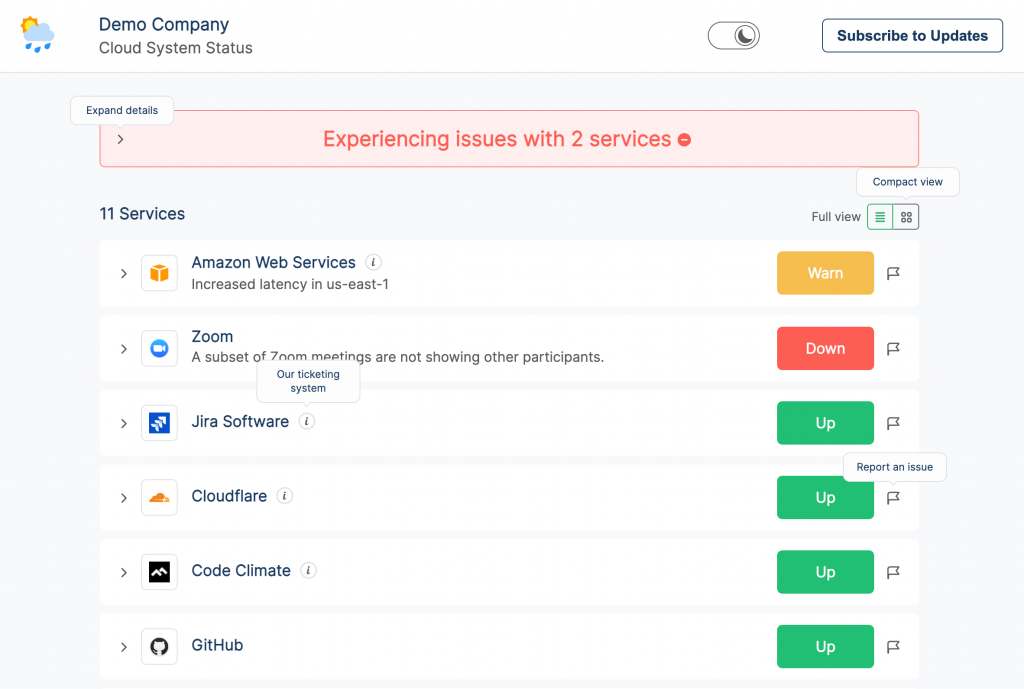
The main Cachet competitor is StatusGator. It is a status page aggregator that packs all the technical punches and then some. StatusGator provides your team with a unified status page for all your services, applications, cloud vendors, etc.
StatusGator caters to over 20k users and allows you to monitor the statuses of 2,700 cloud services. IT teams, academic institutions, and DevOps teams rely on StatusGator for monitoring the statuses of their websites and other third-party services.
The key features that make StatusGator a decent alternative to Cachet include:
StatusGator Pricing
StatusGator has three different pricing plans: Free, Business, and Education.
As the name suggests, the Free plan gives you access to only one status page per user. You can monitor three services simultaneously. This free option might work for solopreneurs and enthusiasts.
Under the Education Plan, you have the following price offers:
- Small — $49 monthly ($45 paid annually)
- Medium — $79 monthly ($72 paid annually)
- Large — $129 monthly ($118 paid annually)
- Extra Large — $199 monthly ($182 paid annually)
Under the Business Plan, you have the following price offers:
- Starter — $79 monthly ($72 paid annually)
- Team — $149 monthly ($137 paid annually)
- Corporate — $299 monthly ($274 paid annually)
- Enterprise — Custom
Whichever plan you choose, you will get a 14-day free trial.
StatusGator vs. Cachet
StatusGator sets itself apart from Cachet by providing the ability to add the status of cloud services to your own status page. This functionality is a major game changer that makes StatusGator a favorite status page option for companies depending on AWS, Azure, Cloudflare, and other cloud services.
It is worth the price considering the functionality. Unlike Cachet, users can start using StatusGator in minutes.
The No.2 Alternative to Cachet — Upptime
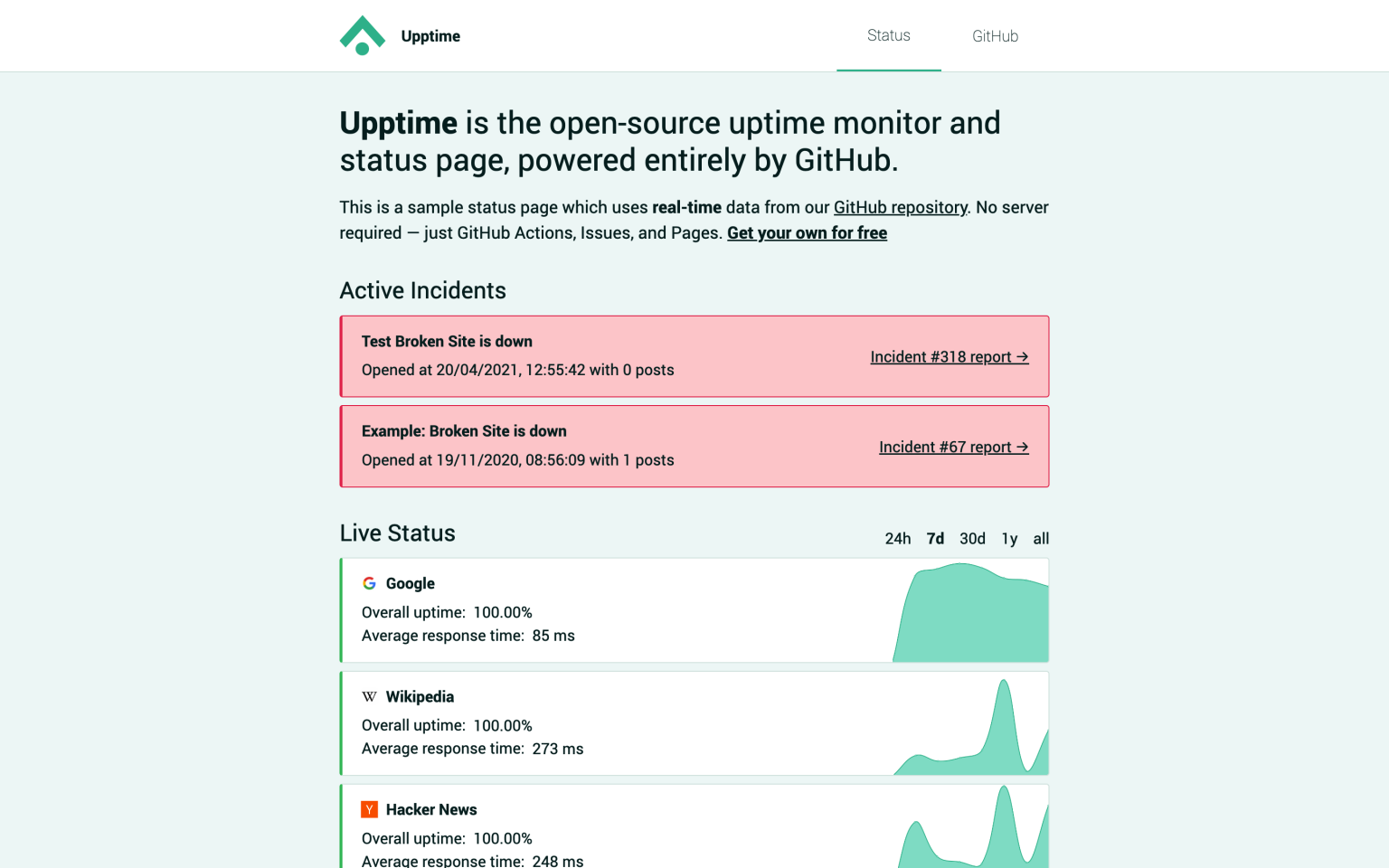
As the name suggests, Upptime is a GitHub-powered open-source solution for a status page with basic uptime monitoring.
Upptime uses the following GitHub resources for providing status page functionality:
- It uses GitHub Actions to monitor uptime by enabling the system to run scheduled checks every 5 minutes — or whenever you set the triggers to go off.
- It uses GitHub Issues for incident reports by automatically creating a new issue whenever an endpoint goes down. You can also configure the system to automatically assign issues to your team members and send them notifications via Slack.
- It uses GitHub Pages for hosting the status website. This statically-generated site will display incident history as well as an intuitive response time graph.
Upptime Pricing
Since Upptime is an open-source platform, it is available for free.
Upptime vs. Cachet
Both Upptime and Cachet are open-source status page solutions. They are also free to use. But the key difference is that Upptime is fully powered by GitHub resources. This Cachet alternative does not have as many setups to get a status page.
The No.3 Alternative to Cachet — Instatus
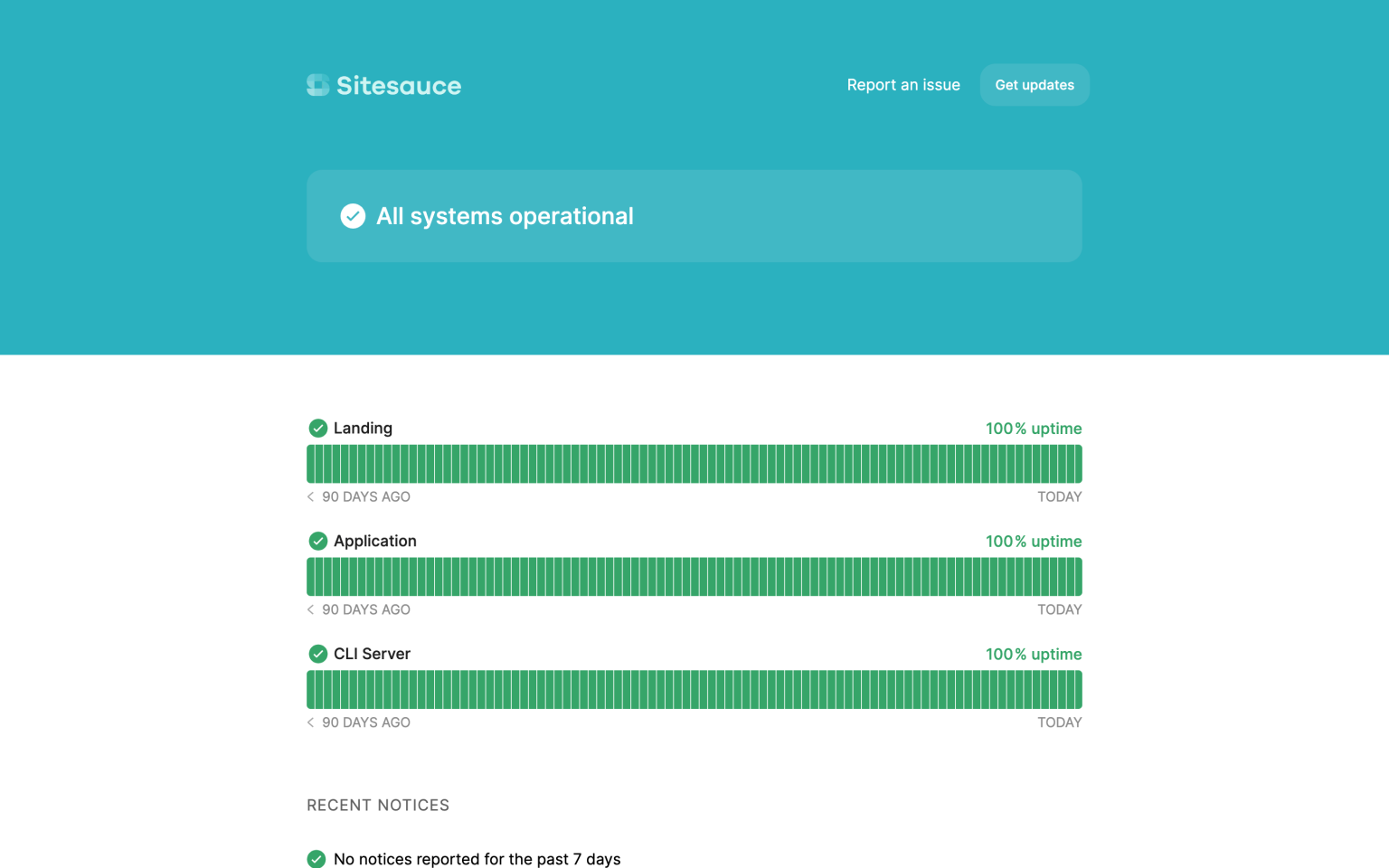
Instatus is a robust solution that allows users to create a status page on their own domain in a few clicks. The solution is compatible with monitoring tools making it a faster-to-set-up Cachet alternative.
The Instatus UI is also sleek—and it supports dark mode as well.
With Instatus, you can update your status page from Slack, display uptime in the Intercom widget, and automatically post status updates to Twitter, Microsoft Teams, and Discord. You can also automate your status page using tools like Datadog, New Relic, Checkly, PagerDuty, Freshping, and Pingdom enhancing the metrics and reporting when integrated with Instatus.

Instatus Pricing
Here are the pricing packages for Instatus (public status page plans):
- Starter — Free (unlimited teammates and subscribers)
- Pro — $20 monthly ($15 if paid annually)
- Business — $300 monthly ($225 if paid annually)
Here are the pricing packages for Instatus (private status page plans):
- Private Pro — $50 monthly ($37.5 if paid annually)
- Business — $300 monthly ($225 if paid annually)
Here are the pricing packages for Instatus (selected audience plans):
- Select — $100 monthly ($75 if paid annually)
- Business — $300 monthly ($225 if paid annually)
There’s an Enterprise plan available offering custom pricing.
Instatus vs. Cachet
Unlike Cachet, Instatus is not free, and neither is it open source. Even though you can use the free version of Instatus, you need to get a subscription to gain access to a custom domain, a private status page, or a status page with access limited to certain viewers.
The No.4 Alternative to Cachet — Status.io
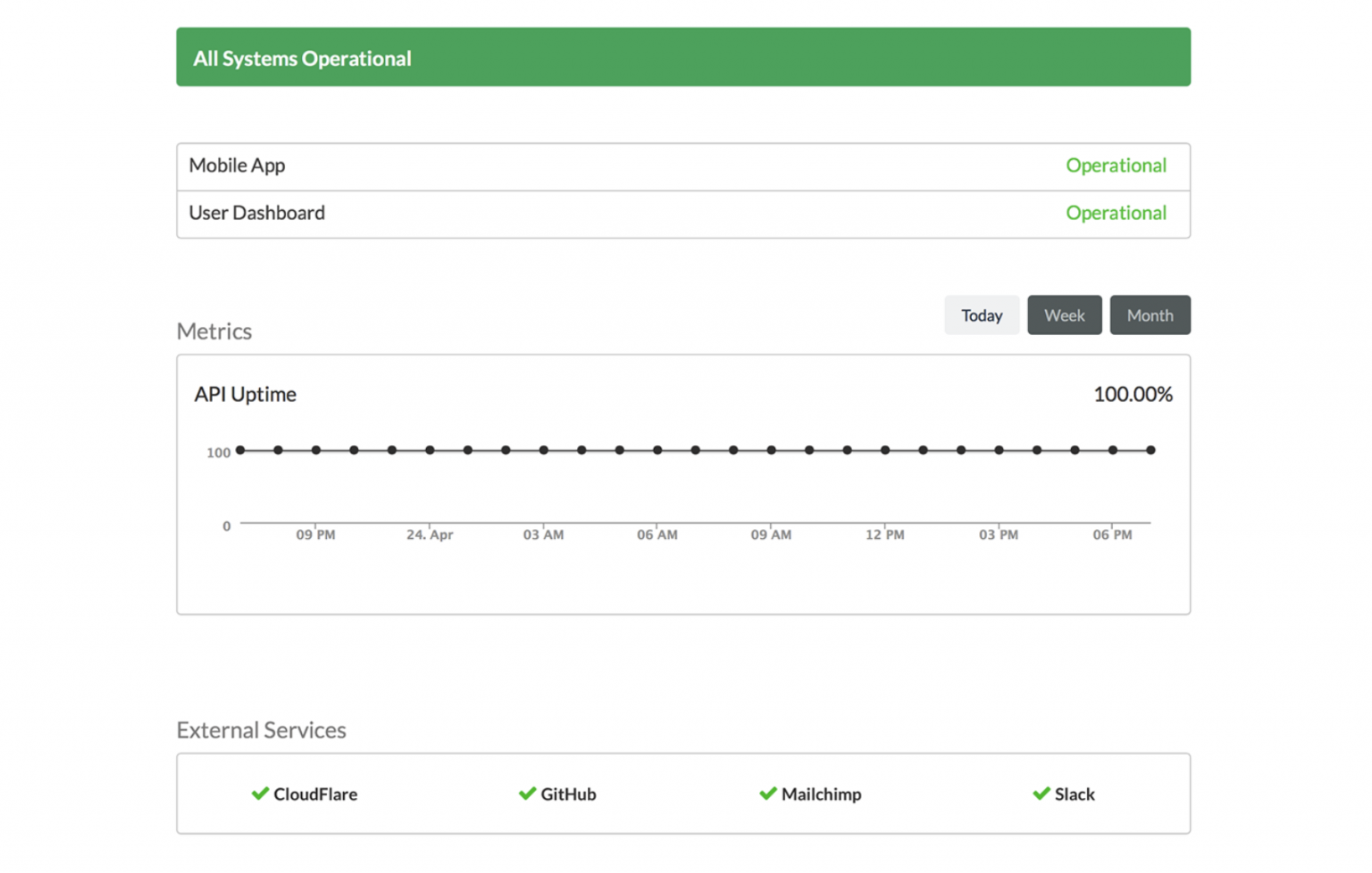
Status.io is a fault-tolerant platform for monitoring the status of websites, applications, and services. Thanks to its human-monitored infrastructure spanning multiple regions, Status.io is quite a reliable alternative to Cachet.
To add an extra layer of protection, Status.io supports multi-factor authentication using the YubiKey hardware security key.
With Status.io, users can monitor multiple status pages from a single account. Integrations with Librato, New Relic, Pingdom, and more. Custom integrations are available using email hooks or the Developer API.
Status.io Pricing
Status.io doesn’t have a free plan. Let’s check out the price of the available subscription plans.
- Basic — $79 monthly
- Standard — $149 monthly
- Plus — $349 monthly
Paying for these subscriptions makes you eligible for perks and features like friendly support, SSL/TLS certificates, custom code (HTML and JS), white-label branding, external service monitoring, and many others.
Status.io vs. Cachet
Cachet is a free platform, while Status.io is available only to paying customers. But Status.io’s reliability and robust features make this status page provider a decent alternative to Cachet.
The No.5 Alternative to Cachet — Statuspage.io
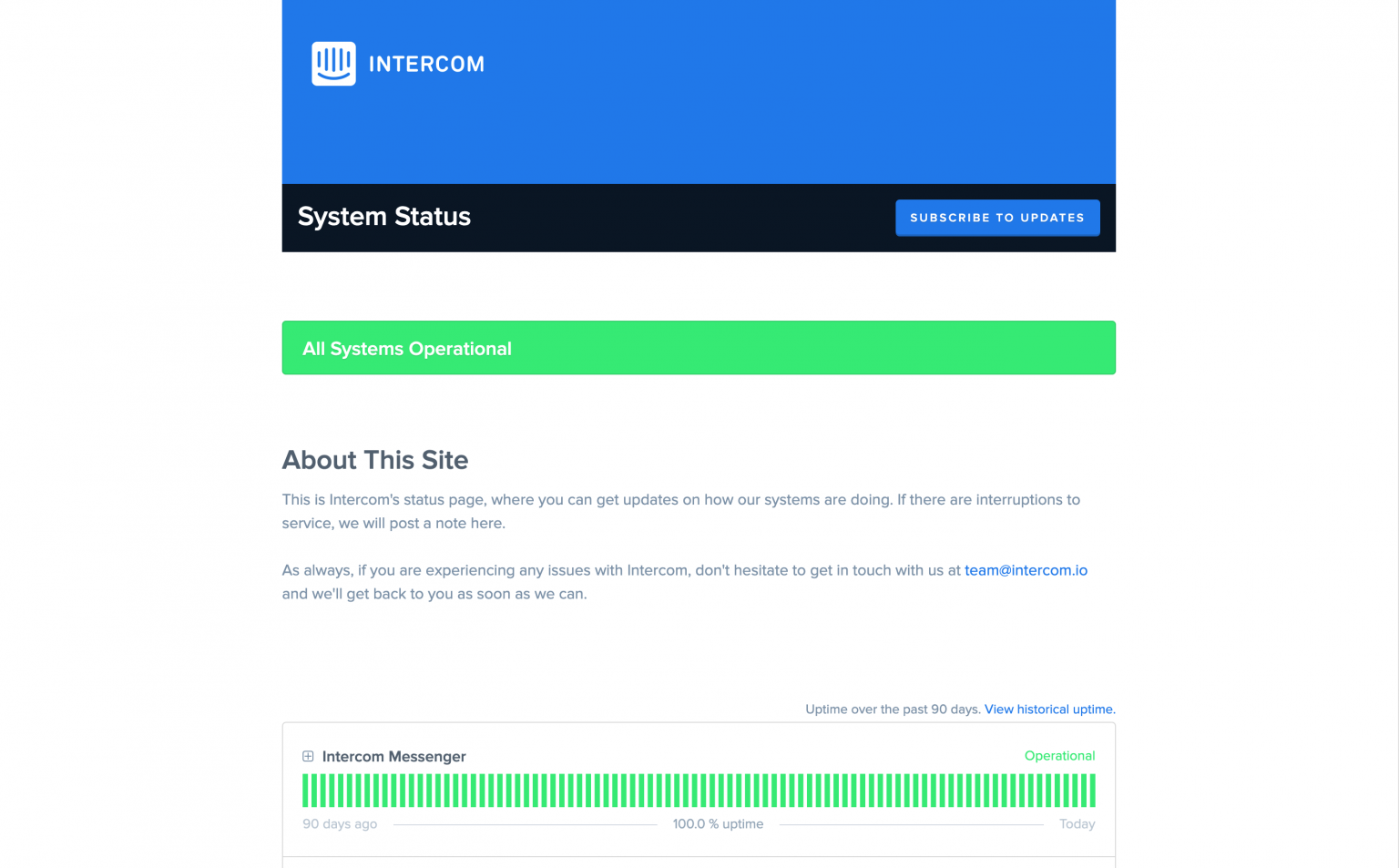
Statuspage.io is a product that helps teams communicate downtimes and maintenance status of services. Backed by Atlassian, Status Page is more than a worthy Cachet competitor because it has a suite of integrations compatible with Atlassian and other third-party tools.
With Statuspage.io, you get a status page solution that is compliant with PCI DSS, GDPR, SOC, and ISO 27001. This solution also provides company-wide protection for your data with the help of SAML, SSO, SCIM, and 2FA.
In addition, you can use Statuspage for public, private, and audience-specific pages. Statuspage also integrates seamlessly with platforms such as Zendesk, Jira, and Microsoft Teams in order to improve response speed and keep customers and internal teams in the loop.
Statuspage Pricing
Statuspage.io has a free plan that accommodates up to 100 subscribers and 25 components. You also get access to REST APIs, two metrics, and notifications.
Let’s check out the pricing for different Status Page plans.
Public pages:
- Hobby — $29 monthly
- Startup — $99 monthly
- Business — $399 monthly
- Enterprise — $1,499 monthly
Private pages:
- Starter — $79 monthly
- Growth — $249 monthly
- Corporate — $599 monthly
- Enterprise — $1,499 monthly
Audience-specific pages:
- Starting price — $300 monthly
Statuspage.io vs. Cachet
Statuspage is quite pricey, although the setup is much easier and straightforward than Cachet.
The No.6 Alternative to Cachet — Uptime Robot
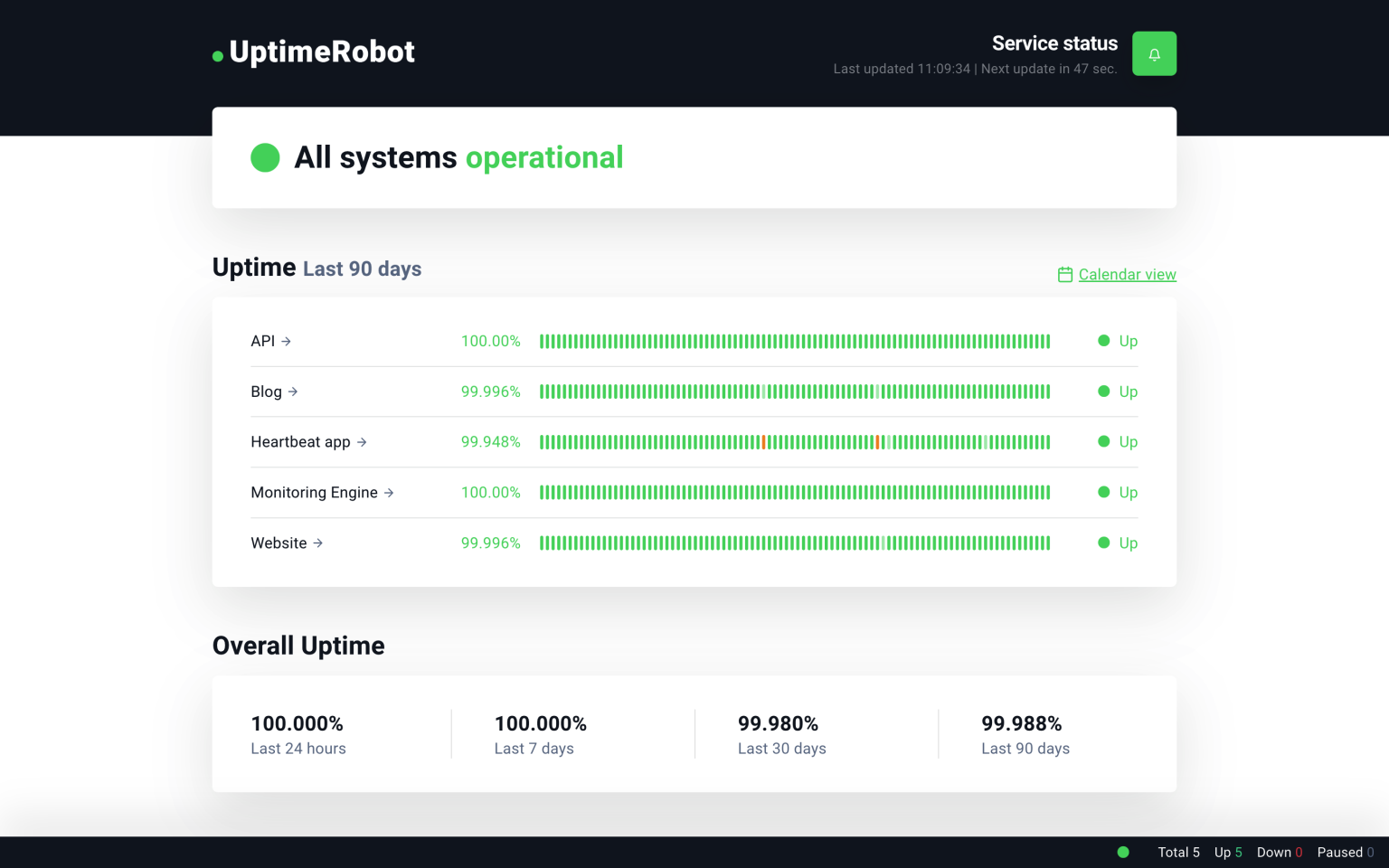
UptimeRobot is a status page provider, but mainly it is an uptime monitoring service that allows you to keep a close watch on incidents.
With UptimeRobot, you can monitor every facet of the application, services, or website in real-time using the following features:
- Website monitoring
- Cron job monitoring
- SSL monitoring
- Port monitoring
- Keyword monitoring
- Ping monitoring
Uptime Robot Pricing
You can sign up for one of these subscription packages depending on your budget:
- Free
- Solo — $8 monthly ($7 paid annually)
- Team — $34 monthly ($29 paid annually)
- Enterprise — $64 monthly ($54 paid annually)
The free plan offers a plain status page without any features except for communicating the status of your service. To customize a status page, get your own domain, and access a private status page, users will have to start with a Team plan.
UptimeRobot vs. Cachet
Users can download UptimeRobot from the App Store or Google Play, but Cachet does not have a dedicated app. As UptimeRobot has a free plan, it doesn’t give you complete access to all core functionalities — unlike Cachet which is completely free.
The No.7 Alternative to Cachet — Better Uptime
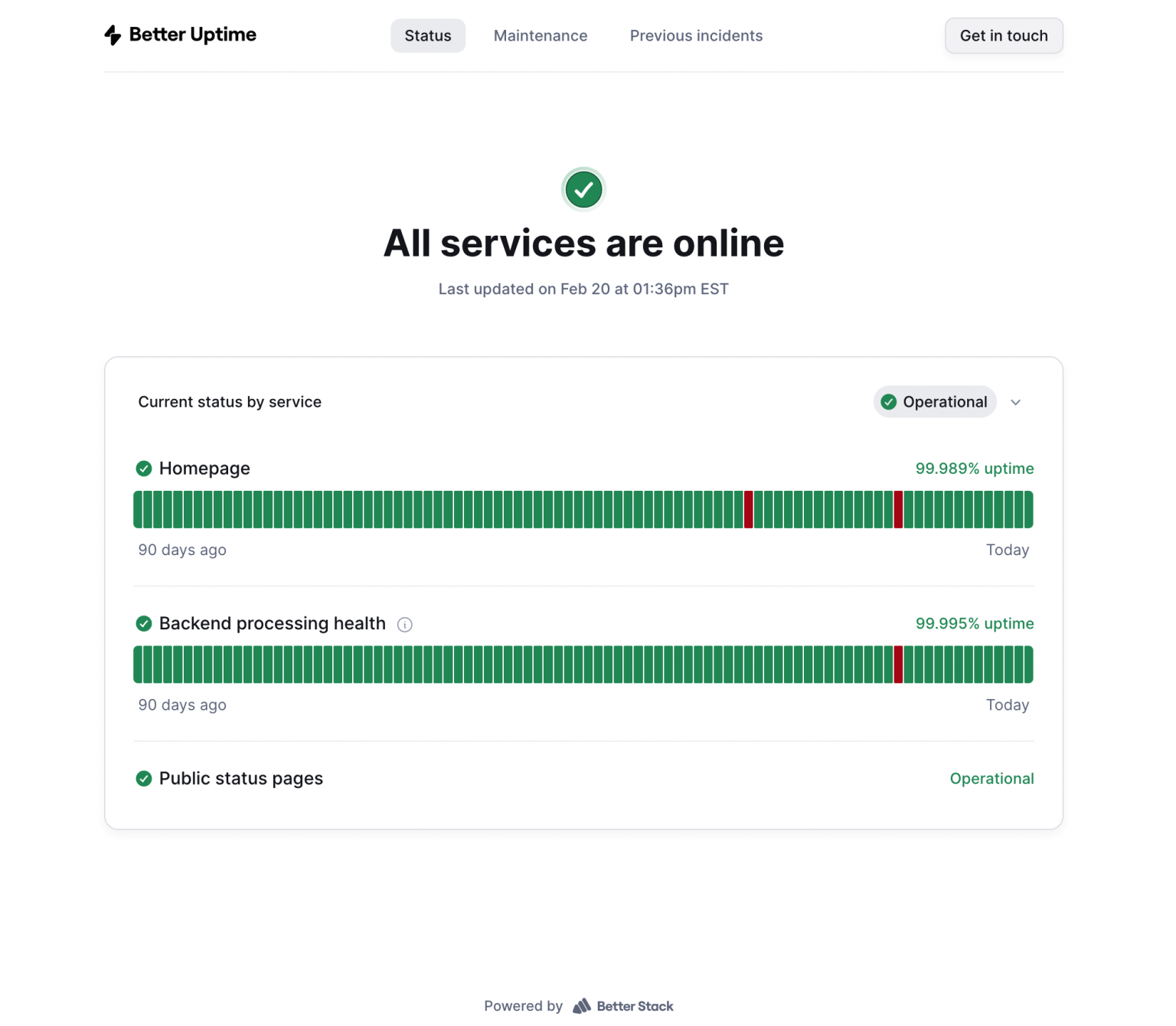
Better Uptime is a customizable platform that allows you to share your uptime on a custom domain. As a Better Stack product, Better Uptime provides seamless integration with SOC-compliant cloud services such as Zabbix, Azure, AWS, and Prometheus.
The sleek dashboard by Better Uptime performs excellently on both desktop and mobile. You can also customize your dashboard to allow flexible incident escalation and smart incident merging.
Better Uptime Pricing
- Basic — Free
- Freelancer — $30 monthly ($24 billed annually)
- Small Team — $100 monthly ($80 billed annually)
- Business — $200 monthly ($160 billed annually)
- Enterprise — Custom quote.
Better Uptime vs. Cachet
The primary advantage of using Better Uptime over Cachet is that it is a part of the observability tool. So for users who are looking for other services apart from the status page – Better Uptime can be a solution.
Comparing Cachet to Status Page Providers
| Criteria | StatusGator | Statuspage | Better Uptime | Cachet | Instatus | Status.io | UptimeRobot | Upptime |
|---|---|---|---|---|---|---|---|---|
| Primary category | communication, monitoring, aggregation | communication | monitoring | communication | communication | communication | monitoring | monitoring |
| Key differences | ||||||||
| Private status page | ✅ On all plans | From $79/month | From $200/month | ❓ | For $50/month | For $349/month | For $348/month | ❓ |
| Components display | ✅ | ✅ | ❓ | ✅ | ✅ | ✅ | ❓ | ❓ |
| Website monitoring | ✅ | ❌ | ✅ | ❌ | ❌ | ❌ | ✅ | ❌ |
| Monitoring - third-party service statuses | 2,800+ | 200 | ❌ | ❌ | 168 | 170 | ❌ | ❌ |
| Trial | ✅ | ❌ | ❌ | ❌ | Only on private pages | ❌ | ❌ | ❌ |
| Cost per month | Starts at $72 | Starts at $29 | Starts at $30 | Free | Starts at $20 | Starts at $79 | Starts at $7 | Free |
| Status page features | ||||||||
| Hosted | ✅ | ✅ | ✅ | self-hosted | ✅ | ✅ | ✅ | ✅ |
| Favicon | ✅ | ✅ | ❓ | ✅ | ✅ | ✅ | ❓ | ✅ |
| CSS | ✅ | On paid plans | ✅ | ✅ | ✅ | ✅ | ❓ | ✅ |
| Branding removal | ✅ | ❓ | ❓ | ❓ | ❓ | On Standard plan and higher | On PRO plan and higher | ❓ |
| Components display | ✅ | ✅ | ❓ | ✅ | ✅ | ✅ | ❓ | ❓ |
| Subscribers to status pages | Unlimited | Limited | Limited. Available on higher plans only | Unavailable | Unlimited | Limited. Quantity depends on the plan | Limited. Available on higher plans only | Unavailable |
| Notifications | Email, SMS, Slack, MS Teams, Discord | Slack email, Webhook | Voice call, SMS, Mobile pushSlack, Microsoft Teams | SMS, Discord Slack, Twitter, Micrisoft teams, email | Twitter, SMS, voice call, Email, Slack, Discord Telegram | Email, SMS, voice call, Slack, Zapier, Twitter | Slack, Telegram, Webhooks |
|
| Password protection | ✅ | On Starter plan and higher | On Business plan and higher | ✅ | On Private PRO plan and higher | Authentication via SSO, SAML Identity Providers, IP Access control | ❓ | ❓ |
| Monitoring | ||||||||
| Ping interval | 5 min | 30 sec | 3 min or 30 sec on Freelancer plan and higher | ❓ | ❓ | ❓ | 5 min or 1 min on PRO plan | 5 min |
| General | ||||||||
| Documentation | Great | Good | Good | Great | OK | OK | OK | Good |
| Support | Contact form, email, chat | Contact form | Email, chat, phone | Email, Help with installation $249 | Chat, email | Chat | GitHub | |
| Account security | 2FA, SSO | 2FA, G Suite and SAML single sign-on | 2FA, GDPR, SSO on Enterprise plan | 2FA | SSO / SAML on Business plan | 2FA with Yubikey,Custom TLS / SSL Certificate, IP filtering, | 2FA | ❓ |
Conclusion
Choosing the right Cachet alternative for your business use can make a world of difference when monitoring the status of applications or cloud services on a customizable status page. Before choosing any status page solutions, always consider the available features, user interface, as well as your specific needs and budget.
FAQ on Cachet Alternatives
Q: What is the alternative to Cachet?
A: An alternative to Cachet is any platform or software program that you can use to set up status pages. Common Cachet alternatives include StatusGator, Upptime, and Statuspage.io depending on the budget and functionality that is needed.
Q: What is the best Cachet alternative?
A: StatusGator is the best Cachet alternative because it allows users to connect cloud services to the user’s status page. With StatusGator, you get access to watch the status of all your dependencies on a single status page.
Q: Who are Cachet’s competitors?
A: Cachet’s competitors include StatusGator, UptimeRobot, Instatus, Better Uptime, Upptime, Status.io, and Atlassian’s Statuspage. These status page services are better than Cachet in specific areas, whether pricing, flexibility, or compatibility with third-party integrations.
More Cachet Status Page Alternatives Offered
Recent Posts



